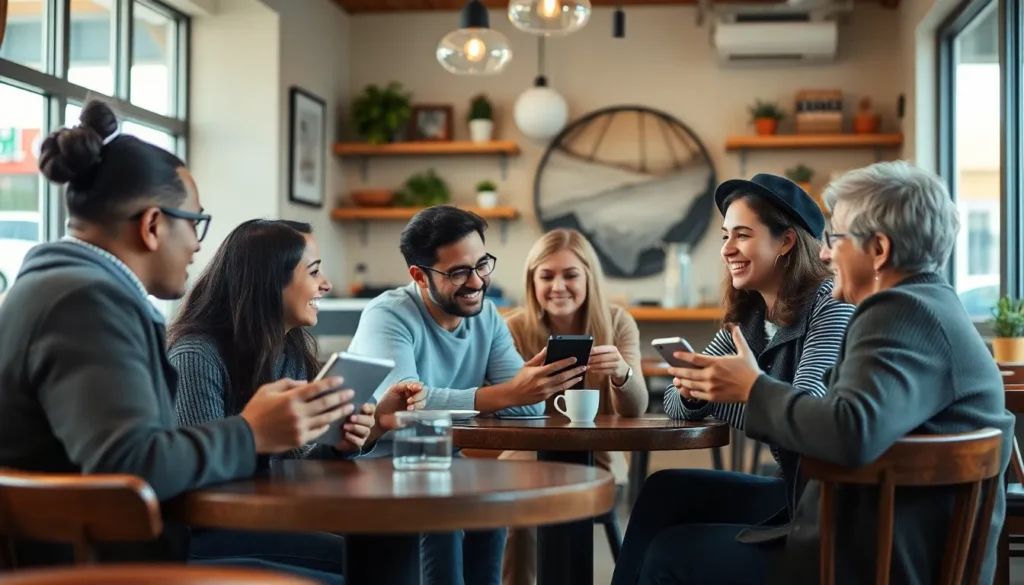Table of Contents
ToggleIn a world where digital connections often overshadow face-to-face interactions, social engagements play a crucial role in fostering meaningful relationships. Whether it’s a casual get-together, a formal event, or simply a shared meal, these moments create opportunities for individuals to bond and communicate on a deeper level.
Understanding the dynamics of social engagements can enhance both personal and professional relationships. From networking events to family gatherings, the art of engaging with others can lead to new friendships, collaborations, and a sense of community. Exploring the nuances of social interactions reveals how they shape our lives and contribute to our overall well-being.
Understanding Social Engagements
Social engagements encompass various interactions that foster connections and build relationships. Recognizing their significance plays a vital role in enhancing both personal and professional dynamics.
Definition and Importance
Social engagements refer to interactions between individuals or groups that create or strengthen relationships. These interactions are crucial as they promote trust and understanding, contributing to overall well-being. Regular social engagement results in improved communication skills, emotional support, and a sense of belonging. Studies indicate that strong social bonds enhance mental health, reduce stress, and increase happiness levels.
Types of Social Engagements
- Casual Gatherings: These include informal meetups, parties, and get-togethers. Casual gatherings encourage relaxed environments that facilitate open conversations and connections.
- Formal Events: These consist of structured occasions, such as conferences, seminars, and corporate events. Formal events allow individuals to network and exchange ideas, often leading to new professional opportunities.
- Online Interactions: These occur through social media platforms, forums, and virtual meetings. Online interactions provide flexibility and accessibility, allowing people to engage without geographical limitations.
- Community Activities: These involve local volunteering, group sports, and participation in cultural events. Community activities foster a sense of belonging and allow individuals to contribute positively to their surroundings.
The Role of Social Media

Social media significantly impacts social engagements, shaping how individuals connect and communicate in the digital landscape. It serves as a platform for various interactions that strengthen relationships.
Impact on Communication
Social media enhances communication by facilitating immediate interactions. Users share updates, thoughts, and experiences across platforms, breaking geographical barriers. Real-time messaging features allow users to converse instantly, fostering deeper connections. Structured posts, comments, and reactions encourage engagement, creating dialogues around shared interests. Research indicates that online interactions can enhance empathy and understanding, as individuals can express themselves more freely through written words.
Creating Online Communities
Social media enables the formation of niche communities where users find like-minded individuals. These online groups provide support, resources, and a sense of belonging. Members participate in discussions, share information, and collaborate on projects, reinforcing connections among participants. Platforms like Facebook Groups and Reddit allow users to join or create communities based on shared interests or experiences. Such connections often extend to offline engagements, encouraging friendships and collaboration beyond the digital realm.
Benefits of Social Engagements
Social engagements provide significant advantages for individuals and communities alike. They contribute to personal well-being and strengthen community bonds.
Enhancing Personal Well-being
Social engagements boost mental health by reducing feelings of loneliness and isolation. Engaging in various interactions, whether casual or formal, fosters emotional support and cultivates happiness. Regular social contact decreases stress levels, leading to improved overall health. Research shows that consistent participation in social activities correlates with higher life satisfaction and lower rates of depression. Engaging with others encourages the sharing of experiences, which can enhance coping mechanisms during challenging times.
Fostering Community Connections
Social engagements strengthen community ties by promoting a sense of belonging. Participating in local events and activities creates opportunities for neighbors to connect and collaborate. These interactions encourage the sharing of resources and support local initiatives, creating a more vibrant community. Furthermore, being actively involved in community activities fosters trust among residents, leading to stronger networks and increased community resilience. When individuals engage socially, they contribute positively to their environment, enhancing the overall quality of life within their neighborhoods.
Challenges of Social Engagements
Social engagements present various challenges that can hinder meaningful interactions. These challenges include overcoming isolation and navigating digital spaces effectively.
Overcoming Isolation
Isolation remains a significant obstacle to social engagement. Individuals may experience feelings of loneliness that prevent them from participating in social activities. Mental health professionals suggest that establishing routines involving social interaction can combat these feelings. Joining clubs, volunteering, or attending community events offers opportunities to build connections. Support groups also provide safe environments for individuals to share experiences and foster relationships. These engagements not only reduce isolation but also promote emotional well-being.
Navigating Digital Spaces
Navigating digital spaces poses its own set of challenges for social engagements. The rise of social media has transformed how people interact, yet it can create barriers. Miscommunication frequently occurs due to the absence of non-verbal cues. To enhance understanding in online exchanges, users can employ clear language and utilize emojis to convey emotions. Setting boundaries around online engagement helps maintain a balance between virtual and real-world connections. Additionally, users must stay alert to privacy concerns and misinformation that can complicate relationships. Adapting to these challenges is essential for maximizing the benefits of digital social engagement.
Social engagements play a vital role in enhancing personal and community well-being. They bridge gaps between individuals and foster connections that enrich lives. By participating in various forms of social interactions, people can combat loneliness and build lasting relationships.
Embracing both in-person and online engagements can lead to a more fulfilling life. Overcoming challenges in navigating these spaces is essential for maximizing benefits. As individuals invest time in nurturing their social networks, they contribute to a stronger sense of community and improved mental health. Ultimately, the positive impact of social engagements resonates far beyond individual experiences, shaping healthier environments for everyone involved.







